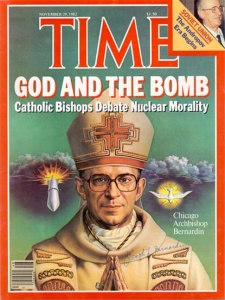On the 64th anniversary of the bombing of Hiroshima, Christianity Today has an op-ed weighing the possibility and ramifications of a nuclear-free world.
I thought this graf was particularly interesting: “Those who use Hiroshima to defend nuclear weaponry are forced to adopt a sort of celebratory triumphalism about the massive, indiscriminate killing of civilians, which contravenes every principle of Christian just war theory. And those on the other side, who use Hiroshima to decry the Bomb, often find themselves in a position that seems to impose a false moral equivalency on both the cause and conduct of World War II-era Japan and America.”
As CT notes, three days after Hiroshima, the U.S. dropped a plutonium bomb known as “Fat Man” on Nagasaki. Six days after that, the Japanese surrendered, and World War II ended. The two blasts and their immediate aftermaths resulted in 150,000-246,000 deaths.
Last month, Archbishop Edward O’Brien of Baltimore, who served for ten years as Archbishop of Military Services, challenged the U.S. to give up nuclear weapons production in a speech that was touted by Catholic progressives.
“Within our Bishops’ Conference I am often a defender of the proper role of military action and a skeptic of easy and naïve hopes,” said O’Brien, who was a chaplain in the army during the Vietnam War. “I know our world remains a dangerous place.”
Nonetheless, O’Brien says: “In Catholic teaching, the task is not to make the world safer through the threat of nuclear weapons, but rather to make the world safer from nuclear weapons through mutual and verifiable nuclear disarmament. … Religious leaders, prominent officials, and other people of goodwill who support a nuclear-weapons-free world are not naïve about the task ahead. They know the path will be difficult and will require determined political leadership, strong public support, and the dedicated skills of many capable leaders and technical experts. But difficult is not impossible.”
Finally, John Gehring of Catholics in Alliance for the Common Good has a useful summation of the U.S. bishops arguments against nuclear weapons (including a mention of this TIME magazine cover story from 1983).





